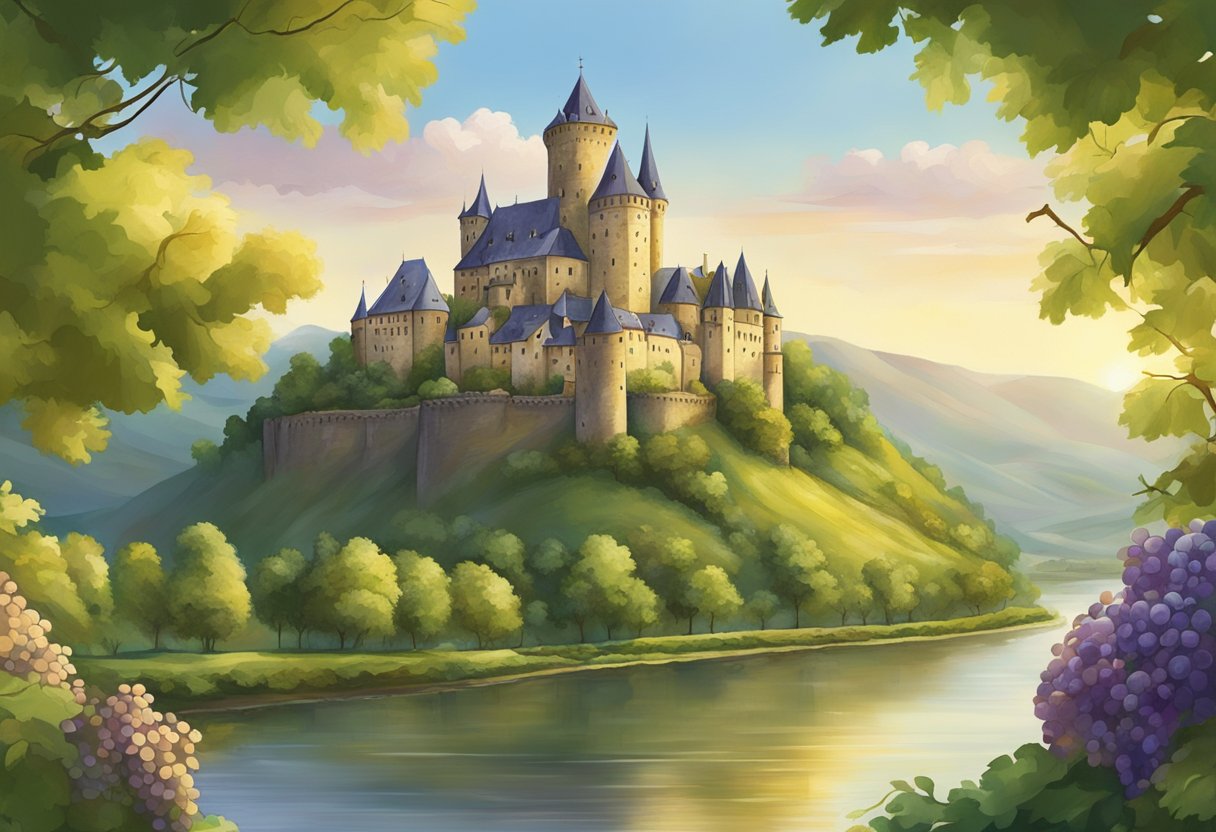The Mosel River slices through Germany like a serpentine maître d’, welcoming visitors to a grand feast of architectural splendor. Threaded with vineyards on its gossamer banks, it parades a regalia of castles that would make any fantasy novelist blush with envy.
These stone sentinels stand as stoic witnesses to time, each with a tale more wrinkled than the last. Visiting them isn’t just a stroke on the travel checklist; it’s akin to walking into the pages of a history book, only with better wine.

Guided by the gentle flows of the Mosel, castle connoisseurs and weekend warriors alike find themselves in Germany’s homage to medieval might. Castles like Burg Eltz don’t just pepper the landscape; they reign over it with grace and a dash of dramatic flair.
Whether one arrives with a thirst for history or the region’s celebrated Rieslings, the castles along the Mosel River promise an escapade that will tickle the fancy of jesters and scholars alike. After all, nothing says ‘grandiose’ quite like a castle with its own vineyard.
Key Takeaways
- The Mosel River in Germany is lined with castles rich in history and charm.
- Castles such as Burg Eltz present a blend of architectural beauty and storied pasts.
- A visit to these castles offers an immersive experience of historical significance and local viticulture.
A Tale of Two Rivers: Mosel and Its Castellated Companions
Nestling between the snug curves of the Moselle River, a plethora of castles stand tall, whispering tales of a medieval past to anyone willing to lend an ear. In a dance of historical prowess, these castellated companions serenade visitors with their architectural charm and stories spun from an era when knights and fortresses were the norms.
- Imperial Castle of Cochem: Perched atop a hill, it gazes down at Cochem with the protective air of a stern grandparent. Visitors can explore its neo-Gothic restoration and imagine life when turrets weren’t just for taking Instagram-worthy pictures.
- Burg Eltz: Defying the common destiny of becoming ruins, this fortress is like a cat with nine lives, having remained intact through centuries. Tucked away in the woods, it’s a fairytale escape where ghost tours are unheard of because the spirits are too polite to disturb the picturesque tranquility.
- Marienburg: High above the river sits Marienburg, proudly donning a neo-Gothic and neo-Renaissance fashion mix. Guests can ascend by cable car, pretending to be modern-day royalty surveying their domain.
These structures don’t just pepper the landscape; they are the Michelin stars that garnish the Moselle. Trier and Koblenz, the river guardians, bookend this journey through time.
Trier flaunts its Roman past, while Koblenz, where Moselle meets Rhine, juggles German history with aplomb, serving both castle connoisseurs and knights-in-training.
| Castle Name | Architectural Style | Notable Feature |
|---|---|---|
| Reichsburg Cochem | Neo-Gothic restoration | Towering presence |
| Burg Eltz | Medieval | Intact interiors |
| Marienburg | Neo-Gothic/Neo-Renaissance | Majestic view |
Amid vine-clad hills, the rivers invite onlookers to traverse German history at these fortresses and palaces. Sometimes, visitors might even stumble upon a medieval festival, where the past and present collide in a splendidly anachronistic jamboree.
One might say, to know the Moselle is to unearth a slice of the UNESCO World Heritage pie, where every turret, tower, and cable car ride is an ingredient in this historical feast.
The Love Affair with Eltz-Juicy Details of Burg Eltz & Friends
Nestled in the verdant hills of the Mosel River Valley, Burg Eltz not only captures hearts with its bewitching beauty but also shares the limelight with other equally enchanting castles in the vicinity, each with their own delightful character and fascinating tales.
Burg Eltz: A Knight’s Dream Home
Burg Eltz, or Eltz Castle as it’s commonly known, is a medieval marvel shrouded by the woods of the Eltz Forest, a stone’s throw away from the town of Alf. This fairytale castle has remained undefeated by time’s relentless siege, maintaining its proud stance since its foundation stone was laid in the 12th century.
- Guided Tours: Visitors flock for the insightful guided tours that breathe life into its stony corridors, revealing intimate details of medieval life.
- Hotel: Although there’s no hotel within the castle, the region brims with charming lodging options.
- Eltz Forest & Interior: The forest itself promises enchanting walks, while the castle’s interior showcases opulent rooms filled to the turrets with art and a certain irresistible character that whispers tales of the Eurus lineage.
Fun Facts:
- Eltz Castle isn’t just a single homogenous entity; three families once shared its mighty walls, each crafting their own distinct domicile within.
- It’s whispered among enthusiasts that even among the castles on the Mosel River, Eltz guards the title of Most Photogenic with a knightly zeal.
Friends of Eltz: Castles Sharing the Spotlight
No castle is an island, and Eltz enjoys the company of some distinguished neighbors, each contributing to the region’s reputation as a castle lover’s utopia.
The Notable Neighbors:
- Metternich Castle: This alluring edifice stands proudly like it’s toasting the Mosel River with its own vintage of historical splendor.
- Burg Thurant & Cochem Castle: Both of these beauties flaunt their classic architectural styles and battling stories that rival any epic.
- Thurant Castle: This gem, perched atop a hill like an eagle eyeing the town of Hatzenport, offers panoramic views that could steal any traveler’s heart.
- Ehrenburg Castle: Don’t let its partial ruins fool you; Ehrenburg still hosts medieval banquets, where one can feast and jest like the lords and ladies of yore.
Character Comparisons:
- Eltz Castle is hailed as the fairytale castle, but Thurant has an air of the formidable fortress about it that makes one’s inner knight want to raise a visor in respect.
- The crumbling grace of Ehrenburg, though less intact than Cochem, has a haunting beauty that could inspire poets and painters alike.
- While Eltz is enveloped by forest, Metternich stands out in its isolated splendor, serving as a beacon for those captivated by historic charm and a good, sturdy stone wall.
These storied stone sentinels, each with their own allure and tales of antiquity, stand united as the Mosel’s magnificent markers of history and fantasy.
Sipping Wine & Scaling Ruins: A Journey Along the Grapevine
As they meander through the Moselle Valley, travelers can’t help but be charmed by the surreal landscapes where the lush vineyards of Traben-Trarbach give way to the majestic ruins of times long past.
Grapes & Gargoyles: Vineyard Castle Hopping
In the Moselle Valley, castles and vineyards are like peas in a pod—except these peas are steeped in history and often doused in Riesling. Visitors can embark on castle hopping adventures, glass in hand, from the Vosges Mountains to the river valley.
Each stop can be a sip in time, such as at Pyrmont Castle, where the famed fruity notes of the region come alive amidst medieval stone.
- Bernkastel-Kues: A must-visit for wine connoisseurs, this town is a stone’s throw from storied vineyards with gothic revival gargoyles peering over rows of grapevines.
- Ehrenbreitstein Fortress: Not directly in the vineyards but worth the detour for its panoramic views and a glass of local wine to toast the river below.
- Guided Tours: They often blend tales of the Middle Ages with tastings, ensuring both your brain and taste buds are equally delighted.
Feasts & Festivals: Where Food Meets History
While the grapes might lure them in, it’s the festivals and food that anchor visitors’ stays. The Moselle Valley is synonymous with its culinary history, threaded together by festivals that celebrate the marriage of food and local culture.
- Medieval Festival: It’s one thing to drink wine like a medieval lord; it’s another to do so while clad in a tunic at a festival. The Middle Ages are alive and well, complete with jesters and spit-roasted fare.
- Restaurant-Hotel Pairings: Nestled near the ruins, the eateries beside the river offer plates piled with regional specialties. After dining, one need only stumble merrily to a nearby hotel, belly full.
One can’t help chuckling at the idea of taking a “bicycle wine tour”—surely a test of one’s ability to navigate on two wheels after a few tastings.
Nevertheless, hopping on a bicycle along the Pyrmonter Felsensteig or pedaling through the arts and culture-laden streets of Traben-Trarbach allows travelers to burn off those fest-feast calories while soaking in the scenic fusion of nature and history.


Leave a Reply